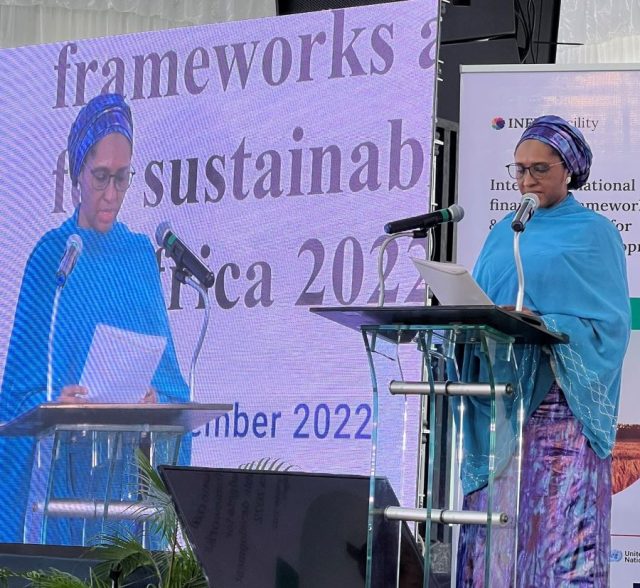THUR. 05 JANUARY, 2023-theGBJournal| The total revenue available for the funding of the 2023 FGN budget is estimated at N10.49 trillion and this includes gross revenues of 63 government owned enterprises totaling N3.87 trillion.
Of this, the Federal Government oil revenue share is projected to be N2.29 trillion non-oil taxes at N2.43 trillion and Federal Government independent revenues at N2.6 trillion.
Other revenues totaling N762 billion are also projected in the 2023 revenues of N10.49 trillion.
On aggregate 22% of the projected revenue are expected from oil related sources while 78% is to be earned from the non-oil related sources.
Recall that the first budget that the President Muhammadu Buhari administration passed, oil revenue was 70% while non-oil revenue contribution was 30%.
”We are very happy that we have been able to turn things around, we’ve turned the story to the opposite direction, that today, only 22% of government revenue is contributed by the oil sector,” says the Finance Minister, Zainab Shamsuna Ahmed while presenting the 2023 Budget breakdown Wednesday.
Meanwhile, analysis of the revenue lines shows that revenue from electronic money transfer is projected to be N19.088 billion in 2023 compared to N29.367 billion in 2022.
There is also the share of revenues from government owned enterprises projected at N3.8 trillion as well as operating surpluses (remittances) that is expected, and the expected independent revenues is projected at N2.615 trillion etc.
The 2023 federal government expenditures, inclusive of government’s owned enterprises and project-tied loans is projected to be N21.83 trillion which is 20% higher than the amended budget of 2022.
The recurrent loan debt spending is estimated to be N8.833 trillion inclusive of the N200 billion for the National Social Investment Programme.
Aggregate capital expenditure of N6.46 trillion is 30% of total expenditure and also 3.5% lower than the 2022 budget, and inclusive of capital components of statutory transfers, government owned enterprises capital as well as project-tied loans.
At N6.309 trillion, debt service is 29% of total government expenditure. This is 71% higher than the estimate for 2022 and it includes interest repayments of N1.2 trillion for the ceded overdraft for the ways and means. N967 billion is projected for statutory transfers.
There is a sitting fund provision as well as a recurrent non-debt expenditure that has increased from N7.108 trillion to N8.32 trillion and also an aggregate capital expenditure that has declined from N6.681 trillion to N6.445 trillion.
Financing the Fiscal Deficit.
The Federal Government overall fiscal deficit is N11.34 trillion for 2023 and this represents 5.03% of GDP, which is higher than what is stipulated by the Fiscal Responsibility Act.
The Ministry of Finance says the Ministry is working with the National Assembly to see what needs to be done- ”whether or not the provision of the Fiscal Responsibility Act needs to be amended because several countries have actually done that.” The Minister argues that ”in times we live today, 3% is no longer realistic.”
The budget deficit is to be financed mainly by borrowings and this includes N7.04 trillion from domestic sources, N1.76 trillion from foreign sources and N1.77 trillion from multilateral and bilateral loan draw downs.
These are loans that have already been acquired and are been implemented. There are also privatization proceeds of N206.18 billion.
The gap between revenue and additional financing and total expenditure amounting to N553.46 billion is been expected to be financed by additional revenues from spectrum fees and tax from the maritime sector.
President Muhammadu Buhari while signing the budget into law Tuesday noted that there is a gap of N553.46 billion that has not been adjusted in the fiscal framework and directed the Federal Ministry of Finance to work with the National Assembly to fix that.
Again, during the appropriation process, the National Assembly identified additional revenues that could be realized from the GSM spectrum license which was not in the original budget document submitted as well as the additional revenues that can be realized from the maritime sector, ”but the fiscal framework was not readjusted and we realized that very late,” the Minister of Finance noted.
In terms of debt management, there are some fiscal sustainability measures which stipulates that public debt as a percentage of GDP should not be more than 40% and that domestic and external debt ratio should be 70/30%.
Currently public debt is 22.8% of GDP but has since increased to 35.33% as at September once adjusted to the ways and means, Zainab Shamsuna said.
She noted that the average tenure of the loans is still within 10-year to 10.28-year, which is the actual but ”we have also progressively worked on improving on that,” the Minister said, ”so that the minimum tenure is 10 years ”but we also have some instruments now that are as long as 30 years.”
The Federal Government has also issued some Guarantees, and Federal Government Guarantees, even though they are not direct borrowing of the Federal Government, they are still contingent liability of government.
Usman says they are taken in to report the size the of government deficits.
”So far, what we have as a percentage of the GDP of Federal Government Guarantees is 2.64% as at November 2022. And we are not planning on debt restructuring.”
The said Nigeria has remained committed to meeting its obligations and has consistently been able to meet both its domestic and external obligations. ”And the projection to the Medium-Term is that this will continue to be so.”
The Federal Government said it will continue to utilize appropriate debt management tolls to streamline the cost as well as the risk profile in the debts including through concessioning borrowings, spreading out debt maturities to make sure that they don’t bunch up, reprofiling the maturities by refinancing short-term debt using longer-term instrument.
Strategic Revenue Growth Initiative
The initiative was designed and launched in 2019 to improve tax revenues from both oil and non-oil sources. There has also been significant improvements in revenues from the Nigerian Customs Service and also very remarkable improvements in revenues from government owned enterprises.
Electronic Money Transfer Levy
The Buhari Administration adopted a practice of, or a tradition of Finance Bill to support the implementation of the annual Budget. And consistent with this practice, the 2022 Finance Bill has the focus of ensuring tax equity and and a couple of provisions that would enhance tax equity, including being able to clarify that 35% of the electronic money transfer levy is also to be shared with the local governments.
”When we passed the first amendment on the electronic money transfer levy, the mention in the Act was for States, which also includes the local governments in the sharing,” Zainab Shamsuna said.
Twitter-@theGBJournal|Facebook-The Government and Business Journal|email:gbj@govbusinessjournal.ng|govandbusinessj@gmail.com










